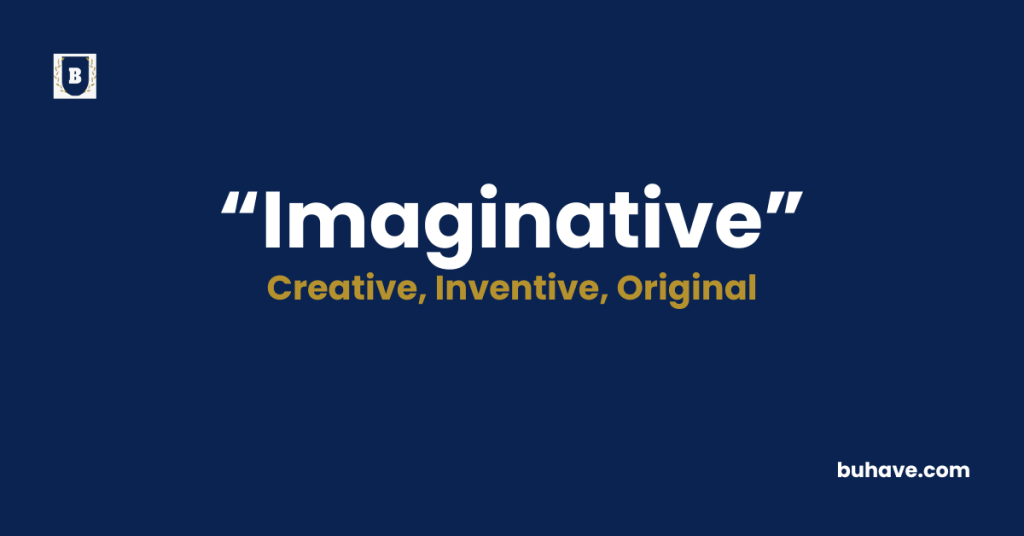The word ‘Imaginative’ (Adjective) describes someone who has the ability to think creatively and inventively, often coming up with new and original ideas. in this guide, you’ll learn the full definition, synonyms, antonyms, etymology, and real-life examples of how to use ‘Imaginative’ correctly in sentences.
Imaginative Explained in Depth
A complete and detailed guide to the words Imaginative including meaning, definition, examples, etymology, synonyms, and antonyms.
Meanings of Imaginative
Imaginative refers to the ability to think creatively and inventively, often coming up with new ideas or concepts that are unique or original. At first, people often associate “imaginative” with artists, writers, or inventors, as they use their creativity to create something novel. In addition, being imaginative isn’t limited to artistic endeavors; it can also apply to problem-solving, where someone finds innovative solutions to challenges. Moreover, imaginative individuals often have a rich inner world, where they explore different possibilities and envision things that others might not see.
Eventually, this ability to think outside the box becomes a valuable skill in many areas, from science and technology to personal relationships. Today, when someone is described as “imaginative,” it highlights their capacity to envision new worlds, ideas, or methods that inspire others.
Definition:
Imaginative describes someone who has the ability to think creatively and inventively, often coming up with new and original ideas. At first, this word was closely associated with artistic or literary creativity, where i used their imagination to create new worlds, stories, or art. In addition, being imaginative doesn’t just apply to the arts; it also includes the capacity to think of innovative solutions to problems or challenges in any field. Moreover, imaginative people are often curious, exploring endless possibilities and envisioning ideas that others might not consider. Eventually, this trait becomes a significant advantage in many aspects of life, from innovation in technology to bringing fresh perspectives in social situations.
Today, being imaginative is highly valued, as it sparks progress, change, and creative breakthroughs in all areas of human activity.
Etymology:
The word “imaginative” originates from the Latin word “imaginari,” which means “to form an image of, to picture to oneself.” At first, “imaginari” referred to the process of creating mental images or ideas in the mind. In addition, the term “imaginative” evolved from the word “imaginatio,” which denotes the act of forming mental images or concepts. Furthermore, as the word moved into Old French and eventually into English during the Middle Ages, it began to carry a more positive connotation, emphasizing creativity and originality. Eventually, “imaginative” became associated with individuals who could not only create mental pictures but also invent new ideas, stories, and inventions.
Today, the word still carries this meaning, highlighting one’s ability to think creatively and explore new possibilities beyond the ordinary.
Example Sentences:
- First, the author’s imaginative storytelling transported readers to a magical world where anything was possible.
- Moreover, the designer’s imaginative approach to the project brought fresh and bold ideas that no one had considered before.
- In addition, her imaginative solutions to complex problems helped the team overcome many obstacles during the project.
- Meanwhile, the child’s imaginative drawings filled the walls with vibrant depictions of fantastical creatures and adventures.
- Finally, his imaginative interpretation of the classic play gave it a modern twist, making it both relevant and exciting to a new audience.
Imaginative Synonyms:
- Creative
- Inventive
- Innovative
- Original
- Visionary
- Artistic
- Inspired
- Resourceful
- Unconventional
- Ingenious
FAQs about Imaginative
Here’s a FAQ-style guide about the word “Imaginative”
1. What does “imaginative” mean?
“Imaginative” is an adjective used to describe someone or something that shows creativity, originality, or the ability to think in new and inventive ways. It often refers to ideas, stories, or people that go beyond the ordinary.
2. How is “imaginative” used in a sentence?
- “She came up with an imaginative solution to the problem.”
- “The artist’s work is highly imaginative and symbolic.”
- “Children are naturally imaginative in their play.”
3. What are some synonyms for “imaginative”?
- Creative
- Inventive
- Visionary
- Original
- Innovative
- Inspired
These words all highlight a capacity for unique or inventive thought.
4. What’s the difference between “imaginative” and “imaginary”?
Imaginative: Describes someone or something creative or inventive.
Example: “An imaginative story.”
- Imaginary: Refers to something not real or existing only in the mind.
Example: “An imaginary friend.”
5. Is “imaginative” a positive word?
Yes. “Imaginative” has a strongly positive connotation and is often used to praise someone’s ability to think outside the box or create original ideas.
6. Can “imaginative” describe people and things?
Yes:
- People: “An imaginative writer”
- Ideas or Solutions: “An imaginative approach to learning”
- Products/Art: “An imaginative film design”
7. How does being imaginative help in real life?
Imaginative thinking supports:
- Creative problem-solving
- Innovation in work or art
- Storytelling and writing
- Design, engineering, and invention
- Empathy and perspective-taking
It’s not just about fantasy—it’s a skill tied to adaptability and vision.
Imaginative Antonyms:
- Uncreative
- Conventional
- Uninspired
- Dull
- Ordinary
- Boring
- Unoriginal
- Practical
- Pedestrian
- unimaginative

















